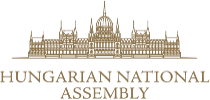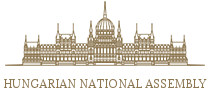The institution of the parliamentary group tied to a party is fundamental to modern-day parliaments. Parliamentary groups provide an efficient vehicle for parties to perform their legislative duty of mediating the will of the people.
Parliamentary groups represent a means of shaping political opinion and of representing it in a uniform manner. They make it possible for a few clear-cut positions and opinions to transcend a hotchpotch of individual views and for those positions and opinions to be pitted against others in parliamentary debate. Organising parliamentary groups thus significantly increases the efficiency and stability of the operation of Parliament.
The Fundamental Law provides that Members of Parliament may establish parliamentary groups in order to coordinate their activities in accordance with the terms and conditions laid down in the Rules of Procedure.
The right to form a parliamentary group inures to the Members of Parliament in one and the same party or in a legal successor to that party.
In the former 386-strong National Assembly, the number of Members required to form a parliamentary group varied between five and 15. In the new, smaller National Assembly, which consists of a total of 199 members, parties that have nominated a joint list of candidates and have won mandates require at least five Members to form a group, but parties with an independent national list of candidates may form a group with three Members.
No Member of Parliament may join more than one parliamentary group. Members may resign from a parliamentary group, and the group itself may decide to expel one of its Members. A Member who has resigned or been expelled shall be deemed to be independent. Independent Member or Member who has become independent shall not take part in the formation of a parliamentary group or join a parliamentary group during its term of office.
The responsibilities of parliamentary groups
Parliamentary groups are formed to coordinate the activities of Members of Parliament. Parliamentary group duties (and rights) basically serve that same purpose.
Parliamentary groups normally represent a uniform political platform in plenary (and committee-level) debates. They occupy positions concerning the approval or rejection of bills and other motions and generally expect their members to align their votes accordingly. Discipline is ensured in parliamentary groups in various ways.
Parliamentary groups and their leaders play a key role in numerous aspects of the work of the National Assembly. For instance, they nominate the parliamentary officers and members of parliamentary committees, and they also draw-up the orders of the day for plenary sittings. Members participate in the deliberations of committees as delegates from their parliamentary group.
Parliamentary group leaders are responsible for representing the opinion of their group at various fora, putting forth the position of the group on important matters at plenary sittings, arranging matters for the group and ensuring that Members attend sittings of Parliament.
The provisions of the Rules of Procedure grant significant powers to parliamentary group leaders. For instance, they are voting members of the House Committee, they may make a proposal to have rejected motions placed on the legislative calendar, they may select Members to ask instantaneous questions etc. The Fundamental Law also provides that parliamentary group leaders shall be consulted for their opinion before the National Assembly is dissolved.
The organisation and operation of parliamentary groups
The provisions of the Rules of Procedure only address the most important parliamentary group-related issues seen as guarantees, such as forming and dissolving groups and managing their finances. They also provide that parliamentary groups elect their leaders, deputy leaders and other officers from among their ranks. When group leaders are occupied with other business, their rights are exercised by their deputies.
The bylaws or regulations adopted by a parliamentary group set down the detailed rules that govern the organisation and operation of the group. Parliamentary group regulations do not constitute a legal norm, but, given that they determine a group's operation and organisation, they influence the manner in which group members exercise their rights and the options available to them.
Unlike plenary sessions and committee meetings, parliamentary groups engage in deliberations in closed meetings. They use group meetings to prepare for plenary sessions, to discuss the position they will advocate regarding various parliamentary matters and to deliberate organisational and personnel matters.




